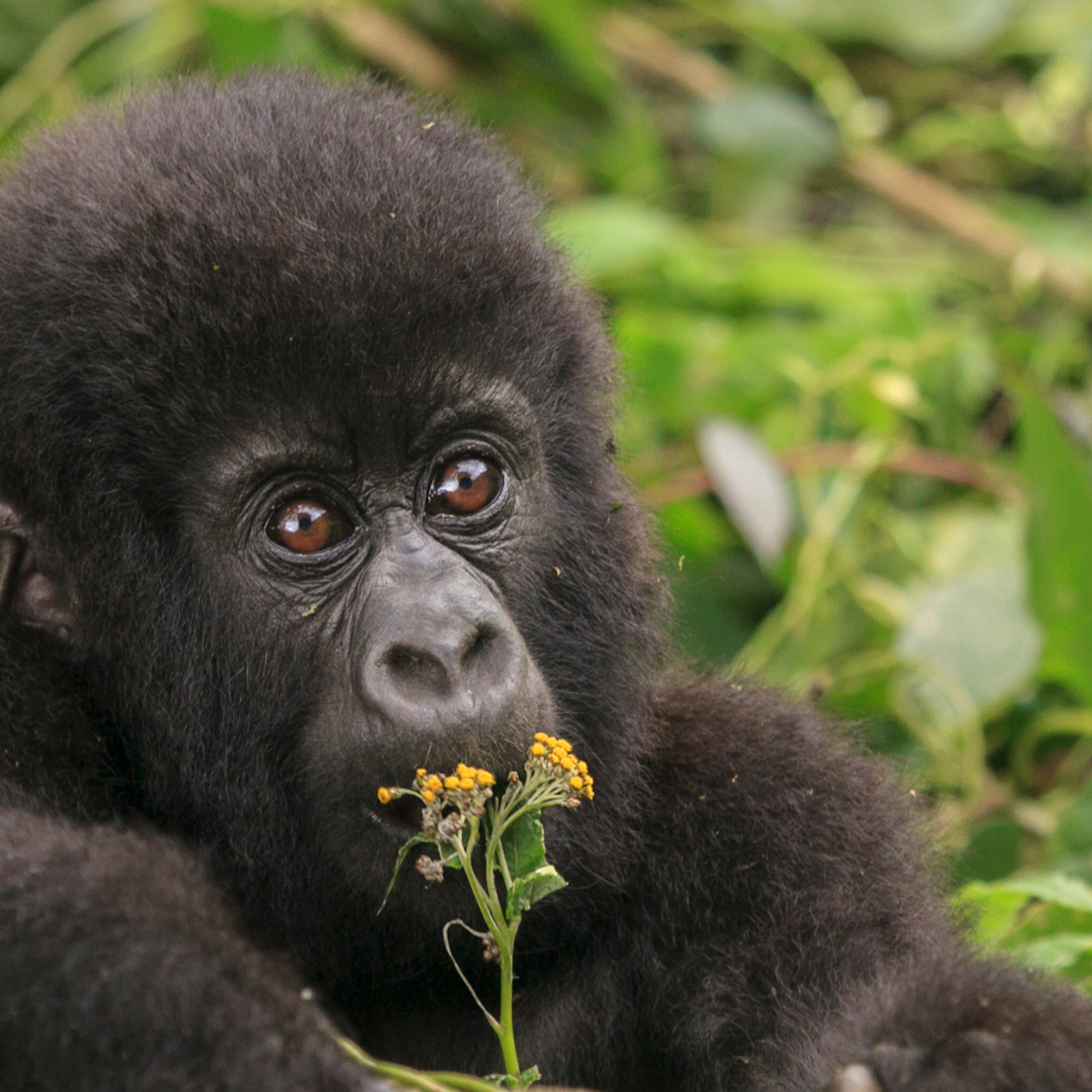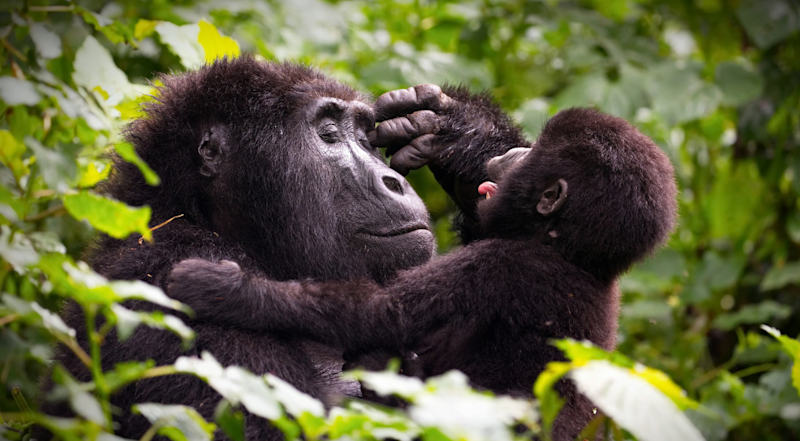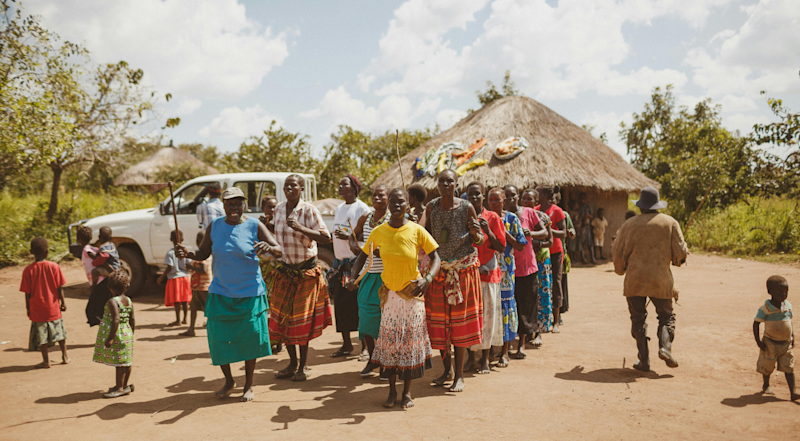
Rwanda tour packages: Explore wildlife, culture & scenic landscapes
Ever stared down a silverback in the wild? Rwanda offers gorilla treks, Big Five safaris, cultural deep dives, and lakeside sunsets—all in one trip. These epic tour packages are the shortcut to your wildest adventure yet.

by Emma Marais
10 min read
Overview:
- Top Rwanda tour packages to consider
- Why should you book a Rwanda travel package?
- When’s the best time to visit Rwanda?
- How to choose a Rwanda tour operator
- Questions people ask about Rwanda tour packages
- What kind of Rwanda trip should you take?
Top Rwanda tour packages to consider
1. Gorilla trekking Rwanda
Duration: 4 days From: USD 3,600 per person
Highlights of your trip
Trek deep into misty bamboo groves to meet gorillas in Rwanda Unwind at charming lodges surrounded by emerald hills and farmland Experience an electrifying Intore dance performance at Iby’Iwacu Cultural Village Explore Kigali’s art scene at Inema Arts Centre and reflect at the Kigali Genocide Memorial
Who this trip is for
Adventure travellers craving rare wildlife up close Photographers hunting that perfect silverback shot Bucket‑listers ticking off one of the world’s top wildlife experiences
2. Rwanda & Uganda Combo Tour: Two-country trekking adventure
Duration: 13 days From: USD $13,430 per person
Trip highlights
Spend an hour face-to-face with mountain gorillas in Bwindi Visit Kigali’s Genocide Memorial and the Inema Arts Centre Safari in the Masai Mara in a private Landcruiser High tea at Elsamere followed by a cruise on Lake Naivasha Walk above the trees on Nyungwe Forest’s canopy walkway Paddle on Lake Kivu and visit nearby fishing villages Short flights between countries so you can skip the long drives

Who this trip is for
Travellers who want to combine gorilla trekking, safari, and culture People curious about Rwanda’s history and conservation work Small groups or couples who want meaningful, well-organised travel Wildlife lovers hoping to see gorillas, chimps, lions, elephants, and more Folks who like comfort and style, but still want a little adventure
3. Rwanda Wildlife Safari – Akagera National Park
Duration: 7 days From: USD $5,210 per person
Highlights of your trip
Two game drives in Akagera National Park for lions, elephants, rhinos, buffalo, and leopards Boat safari on Lake Ihema, home to hippos, crocs, and shoebill storks Cultural deep dive with a banana‑beer tour and vibrant Intore dance Gorilla trekking in Volcanoes National Park to meet an endangered mountain gorilla troop Optional golden monkey tracking or a reflective hike to Dian Fossey’s grave Canoe on Lake Kivu, visiting lakeside villages and sampling local life Canopy walk in Nyungwe Forest for birdwatching and colobus monkey sightings
Who this trip is for
Wildlife lovers chasing rare primates and the Big Five Birdwatchers seeking Rwanda’s dazzling array of species (over 700 and counting!) Adventurers looking for safari drives, canoe trips, and jungle treks. Culture seekers interested in local culture, dance, and history. Photographers seeking the perfect snap of a shoebill or silverback.
4. Ultimate Rwanda: Gorillas, Chimps & Golden Monkeys
Duration: 10 days From: USD 5,660 per person
Highlights of your trip
Spot the Big Five on morning and evening drives in Akagera National Park Cruise Lake Ihema for hippos, crocs, and rare waterbirds Trek to a gorilla family in Volcanoes National Park Walk the treetops on Nyungwe Forest’s canopy walkway Track playful golden monkeys and wild chimpanzees Engage with local artisans, sample banana beer, and join a drum‑powered Intore dance Canoe along Lake Kivu, meeting fishermen and village life
Who this trip is for
Wildlife lovers eager for gorillas, chimps, and monkeys Adventure travellers craving a mix of safari, trekking, canoeing, and culture First‑time Africa visitors wanting the perfect intro to Rwanda travel Couples and solo explorers seeking an active, meaningful escape

5. Rwanda cultural tour
Duration: 2 days From: USD $496 per person
Highlights of your trip
Immersive tour of Iby'Iwacu Cultural Village: cottages, storytelling, and traditional crafts. Nyamirambo Women's Center offers hands-on sisal basket weaving and cookery classes. Lively renditions of traditional music and the Intore dance
Who this trip is for
This excursion is intended for culture aficionados who want to learn about Rwandan history firsthand. Responsible travellers who support sustainable and community-based tourism. Busy travellers looking for a taste of Kigali's art, food, and dynamic districts.
Why should you book a Rwanda travel package?
Guaranteed permissions: Gorilla and golden monkey permits sell out quickly; tours will acquire them for you. Smooth logistics: Local guides handle all transfers from Volcanoes National Park to Akagera Safari. Insider tips: Your tour guide speaks Kinyarwanda, understands hidden pathways, and provides access to local life. Safety and efficiency: Feel confident when navigating national parks, border crossings, and regional airlines. Community impact: Tour fees support conservation projects and village efforts, allowing you to give back while exploring.
When’s the best time to visit Rwanda?
June to September: This dry season is ideal for spotting mountain gorillas in Volcanoes National Park. Trails are easier to navigate and the skies tend to stay clear. March to May: Expect lush landscapes and fewer crowds. It’s wetter, yes—but incredibly scenic, especially in Rwanda’s national parks. April: Typically sees the heaviest rainfall. Some rural areas can be harder to access, but the upside is serene trekking conditions and discounted rates.
How to choose a Rwanda tour operator
Here’s what matters most:
Are permits included? For gorilla or chimp tracking, this is non-negotiable. They cost about $1,500 each. Check their reputation. Use TripAdvisor or TourRadar to read verified, recent reviews. Ask about group size. Small groups often lead to richer, more flexible experiences. Prioritise local guides. They offer deep insight into wildlife, culture, and Rwanda’s history. Look for sustainability credentials. Community-based tourism, eco-lodges, and conservation partnerships matter.

